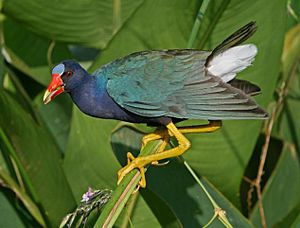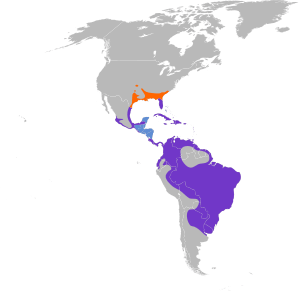American purple gallinule facts for kids
The purple gallinule (Porphyrio martinicus) is a colorful bird found in swamps. It belongs to a group of birds called swamphens. This bird is also known as the yellow-legged gallinule because of its bright yellow feet. Its scientific name, martinica, means "from Martinique", an island in the Caribbean.
Quick facts for kids Purple gallinule |
|
|---|---|
 |
|
| Conservation status | |
| Scientific classification | |
| Genus: |
Porphyrio
|
| Species: |
martinicus
|
 |
|
| Synonyms | |
|
|
Contents
What Does It Look Like?
The purple gallinule is a medium-sized bird. It is about 26–37 cm (10–15 in) long. Its wings can spread up to 50–61 cm (20–24 in) wide. These birds usually weigh between 141–305 g (5.0–10.8 oz). Male birds are a bit bigger than females.
Colors and Features
Adult purple gallinules have amazing purple-blue feathers. These feathers can shine green and turquoise in good light. They also have a light blue shield on their forehead. This shield connects to a bill that is red and yellow. In dim light, their bright feathers might look a bit brownish. But the blue forehead shield helps tell them apart from other similar birds.
Young purple gallinules look different. Immature birds are brown-bronze. They have some purple feathers on their chest. Their bill and forehead shield are pale. Very young birds are light brown. They have hints of green-bronze on their wings and back.
Legs and Feet
Purple gallinules have long legs and very long toes. These long toes help them walk on top of floating plants. They spread out their weight so they don't sink. Their toes also help them hold onto plant stems. Adult birds have bright yellow legs and feet. Younger birds have brownish-yellow or brown legs and feet. When they fly, their legs hang down. They usually fly only short distances.
Where Do They Live?
These birds live in the southeastern parts of the United States. This is where they raise their young. They live all year in southern Florida and along the coasts of Mexico. You can also find them in parts of Central America and the Caribbean.
Migration and Travel
During the non-breeding season, they move more inland in Central America. They also travel to South America. Sometimes, they fly very far from their usual homes. They have been seen as far north as Canada and as far south as Tierra del Fuego. They have even been spotted in places like Iceland and Great Britain! This shows how far these birds can travel.
How Do They Live?
Purple gallinules build their nests on floating plants. These nests are found in thick plants along the edges of lakes, rivers, and marshes. A female bird usually lays between five and ten eggs. The eggs are light pink or buff with brown and purple spots.
Family Life
A pair of purple gallinules will defend their nest and the area around it. They stay together as a pair. Their young birds often stay with them. These older young birds help take care of their younger brothers and sisters.
What Do They Eat?
Purple gallinules eat many different things. They find their food on the ground. Their diet includes both plants and small animals. They eat seeds, leaves, and fruit from water and land plants. They also enjoy insects, frogs, snails, earthworms, and small fish. Sometimes, they even eat the eggs and young of other bird species.
How Do They Find a Mate?
Purple gallinules have special ways of showing off to find a mate. Both male and female birds do these displays. It often happens when two birds of a pair meet again after being apart.
Courtship Dance
They perform a "principle display" together. In this display, the bird stands leaning slightly forward. Its neck is stretched out. Its wings are held out almost straight from the body. The wings are bent at the wrist, with the main feathers pointing down. After this, one or both birds might walk proudly. They might cross in front of the other bird with their wings partly lowered. Or they might make a deep bow as they get close to each other.
Gallery
-
A purple gallinule walking in Everglades National Park, Florida, USA.
-
A purple gallinule in the water in Everglades National Park, Florida, USA.
-
An adult purple gallinule feeding a chick at the Green Cay Wetlands, Florida, USA.
- Kaufman, Kenn; Lives of North American Birds. Houghton Mifflin Company, New York, NY (1996).
See also
 In Spanish: Calamoncillo americano para niños
In Spanish: Calamoncillo americano para niños






